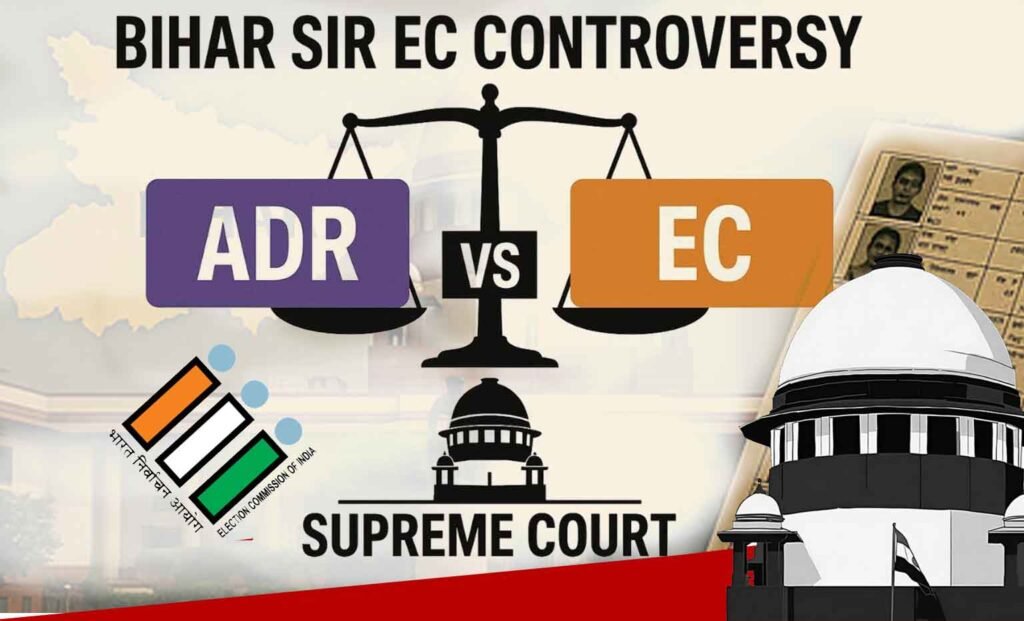The Association for Democratic Reforms (ADR) has informed the Supreme Court that the Election Commission of India (ECI) has withheld crucial details regarding the deletion of nearly 65 lakh names from Bihar’s electoral roll. Despite possessing the data, the ECI allegedly removed the column citing reasons for deletion from the draft roll published on August 1, 2025.
The Supreme Court, in response, has directed the ECI to submit its reply by Saturday. The Court has also asked the ECI to clarify whether the draft roll was shared with political parties before publication, and if so, which parties were given access to it.
According to ADR, in an earlier version of the electoral roll circulated among some political parties on July 20, 2025, a column titled “Uncollectable Reason” was included. This column detailed the grounds for not submitting Enumeration Forms. However, in the list released after the draft roll was made public, this column was removed, effectively concealing the rationale behind each deletion.
The ADR argues that this omission departs from the past practice of publishing the names of deleted voters in the booth-level rolls, along with a summary of additions and deletions on the final page. The new format, they claim, prevents political parties, citizens, and other stakeholders from verifying the legitimacy of the deletions.
Crucially, voters whose names are missing from the draft roll are not entitled to legal remedies such as notice or personal hearings under Rule 21A of the Registration of Electors Rules, 1960. This lack of recourse places them at the highest risk of disenfranchisement, ADR warns.
“The ECI’s decision to conceal the reasons for deletion appears to be an attempt to prevent public scrutiny,” the application states. “There is no way to confirm if the removed names belong to deceased individuals, those who have permanently migrated, or voters with duplicate entries.”
ADR has cited the ECI’s own press release from July 25, which stated that 22 lakh electors were found to be deceased, 7 lakh were registered in more than one location, and 35 lakh had permanently migrated or were untraceable. The group contends that this press note confirms the ECI holds detailed data on the deletions but has failed to make it public.
Further, the ADR application calls attention to the ECI’s June 24 directive, which mandates the publication of booth-wise lists of electors whose Enumeration Forms were marked “not recommended” by Booth Level Officers (BLOs). However, the ADR claims that no such list has been released, and no clear guidelines have been issued on how BLOs are making these recommendations. In certain districts, the rate of “not recommended” forms is alarmingly high — 10.6% in Darbhanga and 12.6% in Kaimur.
In its petition, ADR has requested the Supreme Court to direct the ECI to:
- Publish a full, constituency and booth-wise list of all 65 lakh deleted electors along with specific reasons for deletion.
- Release the booth-wise list of voters from the August 1 draft roll whose Enumeration Forms were marked as “not recommended” by BLOs.
- The petitions challenging the validity of the Bihar Special Intensive Revision (SIR) process are scheduled to be heard on August 12.
Background of the Dispute:
The controversy centers around the Election Commission of India’s (ECI) decision to delete approximately 65 lakh names from the Bihar electoral roll as part of a Special Intensive Revision (SIR) process.
Timeline and Key Events:
June 2025 – Special Intensive Revision Announced
The ECI initiated a Special Intensive Revision (SIR) of electoral rolls in Bihar ahead of the upcoming elections. The revision was intended to clean the rolls by removing names of deceased voters, duplicate entries, or those who have migrated.
July 20, 2025 – Data Shared With Parties
Some political parties were reportedly given pre-publication versions of the draft roll that included a column titled “Uncollectable Reason”, which explained why names were deleted. This column reportedly referenced reasons like “deceased,” “migrated,” or “untraceable.”
July 25, 2025 – ECI Press Note
The ECI issued a press release stating that:
22 lakh electors were found to be deceased, 7 lakh were registered in more than one location, 35 lakh had permanently migrated or were untraceable
August 1, 2025 – Draft Roll Published
The official draft electoral roll was published. Controversially, the column that specified reasons for deletion was removed in the final version. This led to concerns from civil society and political groups, who argued it made the deletion process opaque.
ADR Moves the Supreme Court
The Association for Democratic Reforms (ADR) filed an application in the Supreme Court, alleging that the ECI: Withheld reasons for deletion Deviated from past practices of transparency. Disenfranchised lakhs of voters without giving them any notice or right to object. ADR also raised concerns about Booth Level Officers (BLOs) marking voters as “not recommended” without a transparent process or guidelines.


